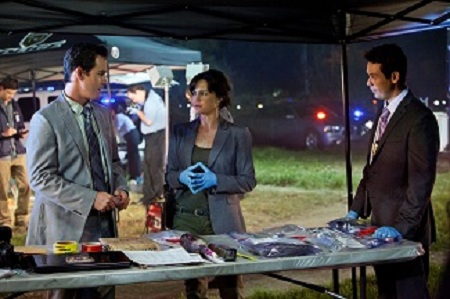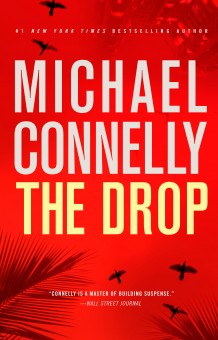
Once upon a time, years, maybe decades ago, there used to be the TV Movie of the Week.
Every channel had one and, if I remember correctly, a lot of them were pretty good.
Movies that excited us and entertained us, even if many of them didn't make us think too much.
But as quick as they came, those TV Movies of the Week disappeared. Of course, back then channels were limited and the vast number of cable networks, many of which now have their own original films, didn't exist.
But the TNT Network not only is reviving the movie of the week, but the upcoming program should appeal to many mystery fiction lovers.
Scott Turow's Innocent launched TNT’s “Mystery Movie Night,” which will be weekly adaptations of novels by Sandra Brown, Lisa Gardner, Richard North Patterson, April Smith, Mary Higgins Clark and Carol Higgins Clark, and Patricia Cornwell.  And judging by the advance screenings, these are first-rate productions with good scripts. TNT also has landed some intriguing actors such as Dermot Mulroney, Anne Heche, Judd Hirsch, and Jane Alexander.
And judging by the advance screenings, these are first-rate productions with good scripts. TNT also has landed some intriguing actors such as Dermot Mulroney, Anne Heche, Judd Hirsch, and Jane Alexander.
Although Innocent first aired Nov. 29, it will have frequent encores. Innocent picks up years after Turow's breakout 1990 novel Presumed Innocent ended.
Presumed Innocent made it to the big screen with Harrison Ford as Chicago attorney Rusty Sabich who was accused of killing a colleague with whom he'd had an affair.
On the small screen, Bill Pullman aptly takes over as Rusty who's now accused of killing his wife, played by Marcia Gay Harden.
No spoilers, but if you are the 10 people who have never read Presumed Innocent, do so before you see the TNT version of Innocent. Of course, I recommend reading the books first anyway.
I guess technically these aren't movies of the week because Ricochet, based on the novel by Sandra Brown premieres at 9 p.m. Nov. 30. Ricochet follows two homicide detectives whose careers – and lives – are on the line during a case of murder and betrayal in high-society Savannah. (I actually saw the crew filming portions of Richochet when I was last in Savannah.)
Emmy nominee John Corbett (Sex and the City, Northern Exposure) stars as Det. Sgt. Duncan Hatcher, who is investigating a corrupt judge, played by Gary Cole. Hatcher also becomes romantically involved with the judge’s wife, played by Julie Benz (Dexter).
I am especially looking forward to Hide, based on Lisa Gardner's novel airing at 9 pm, Dec. 6. (I loved the novel). Hide stars the ever-reliable Carla Gugino as Boston Police Detective D.D. Warren, who is called to the grounds of an abandoned mental hospital where a buried chamber with the remains of six young women is discovered. The case leads D.D. to Annabelle (Bridget Regan), who spent her childhood moving from city to city in hiding. Mark-Paul Gosselaar (TNT’s Franklin & Bash, NYPD Blue) plays Alex Wilson, and Kevin Alejandro (True Blood, TNT’s Southland) is Det. Bobby Dodge.
Richard North Patterson's Silent Witness airs at 9 pm, Dec. 7, starring Dermot Mulroney as defense attorney Tony Lord, who returns to his hometown to defend his friend (Michael Cudlitz of TNT’s Southland), a teacher accused of murdering one of his students. The case will force Tony to relive his past when, as a high school student, he was accused of murdering his first love. Silent Witness also stars Anne Heche and Judd Hirsch. April Smith's Good Morning, Killer airs at 9 pm, Dec. 13, starring Catherine Bell, Cole Hauser, William Devane, Titus Welliver and Suleka Mathew. (Loved that novel, too)
April Smith's Good Morning, Killer airs at 9 pm, Dec. 13, starring Catherine Bell, Cole Hauser, William Devane, Titus Welliver and Suleka Mathew. (Loved that novel, too)
And, appropriately, Mary Higgins Clark and Carol Higgins Clark will take us to the holidays with Deck the Halls, airing 9 pm, Dec. 20 with Kathy Najimy, Scottie Thompson, Jane Alexander and Larry Miller.
TNT also is looking ahead toward next Spring with an adaptation of Patricia Cornwell's Hornet’s Nest. This novel is not part of Cornwell's Kay Scarpetta series but was the first in her mini-series featuring reporter Andy Brazil (Robbie Amell), Police Chief Judy Hammer (Virginia Madsen) and her top deputy, Virginia West (Sherry Stringfield). Set in Charlotte, N.C., Hornet's Nest follows the investigation of a serial killer who targets out-of-town businessmen.
Leave it to the channel that gives us Leverage, Rizzoli & Isles, The Closer and Southland to find new ways to entertain us.
And don't forget, reading these novels will make seeing the movie version even better.
Photos: Top, Hide with Mark Gosselaar, Carla Gugino and Kevin Alejandro; Center, Silent Witness with Dermot Mulroney and Judd Hisch; Bottom photo, Good Morning Killer with Catherine Bell and Cole Hauser. Photos courtesy TNT.


 The Grand Master is the highest honor that the
The Grand Master is the highest honor that the 
